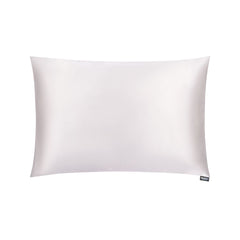It goes without saying that allergens can cause debilitating symptoms for those who suffer from certain conditions like allergic rhinitis, dust allergies and even sensitivities to certain chemicals that are used in the manufacturing process of textiles. The popularity of silk has increased considerably in recent years as people finally begin to understand how the uber soft textures can help protect the hair and prevent frizz, but did you know that silk also has another hidden property? As a certified hypoallergenic, it’s been brought to our attention that silk could be the answer that every allergy sufferer has been looking for. Read on to find out more…
The answer to why silk may be able to reduce allergy symptoms is rooted in how it is made. As a natural fibre, silk is harvested from silkworms during a slow, labour intensive and costly production process. This means that the material is considered a luxury and often comes with an appropriate price tag too. Silk fibres are also coated in a protein known as sericin which acts a ‘glue’ that manages to hold each individual thread together in order to form a material that is luxuriously soft and gentle on the silk.
Silkworms spin their cocoon in order to prevent predators from getting inside and this means that attire that is made from silk helps prevent unwanted allergens from sticking to it and the material itself actively repels mold, fungus, dust mites and bedbugs too. As such, sleeping on silk bedding, in silk pyjamas or on a silk pillowcase is thought to reduce the prevalence of allergy symptoms because sufferers are less likely to come into contact with these allergens.
Another quality of silk that may help those with allergies is the soft texture that it possesses. Some allergies can present themselves on the skin and the silky smooth characteristic of silk means that the material will glide over sensitive skin without causing further inflammation. Further to this, silk is also made using a very simple process and opts for water, steam and heat during the manufacturing process which is a lot gentler than the chemicals typically used in cotton production.
Silk is a fibre that manages to tick a lot of boxes from the outset. It is naturally produced by silkworms and the sericin protein holds each individual fibre together in order to give it the luxuriously smooth softness that it is known for, and it is this protein that gives silk its hypoallergenic qualities. If you’re an allergy sufferer who just can’t seem to beat the bed bugs then sleeping in silk pyjamas may be the answer! Speak to a member of the DREAMSILK team to find out more today.



Leave a comment